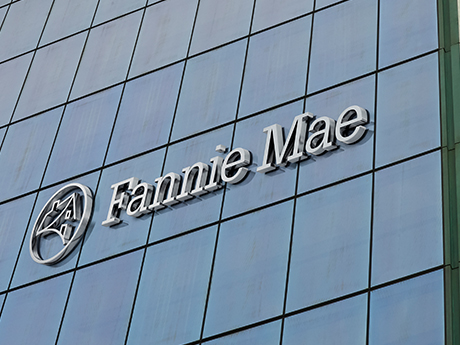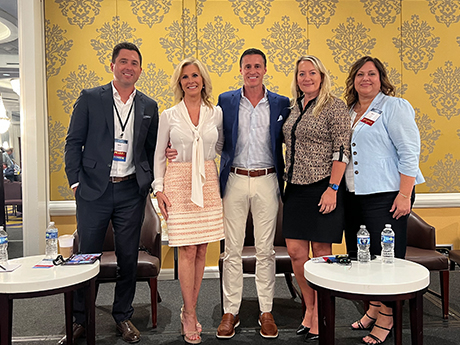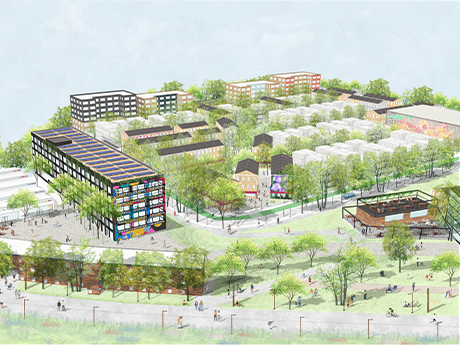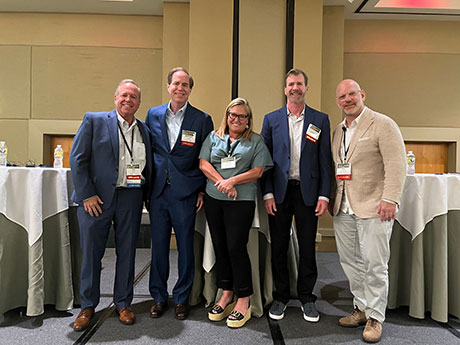The multifamily divisions of Fannie Mae and Freddie Mac are off to a slow start this year as the government-sponsored enterprises (GSEs), their network of lending partners and multifamily borrowers contend with rising interest rates. Fannie Mae’s volume of new multifamily business totaled $10.2 billion in the first quarter of 2023, which is a 36 percent decrease from the same period a year earlier when the agency closed $16 billion. Freddie Mac closed $6 billion in new multifamily business in the first quarter, a year-over-year decrease of 60 percent. Seasoned agency lending professionals all point to elevated borrowing costs as the primary reason for the two agencies closing less business thus far in 2023. “The rapid increase in rates across the board has really been a shock to the industry,” says Vic Clark, senior managing director and head of conventional multifamily production at Lument. At its May meeting, the Federal Open Markets Committee raised the federal funds rate to a target range of 5 to 5.25 percent. The fed funds rate is the interest rate that U.S. banks charge each other to lend funds overnight. This time a year ago, the short-term benchmark rate was at a range of 0.75 …
Southeast Feature Archive
Affordable HousingDistrict of ColumbiaFeaturesLoansMultifamilySeniors HousingSoutheastSoutheast Feature ArchiveStudent Housing
Affordable HousingBuild-to-RentConference CoverageFeaturesMultifamilyNorth CarolinaSingle-Family RentalSouth CarolinaSoutheastSoutheast Feature Archive
Suburbs Are King for Carolinas Multifamily Market, Say InterFace Panelists
by John Nelson
Suburban markets in the Carolinas are the big winners in the current multifamily landscape, both from a new development and rent growth perspective, according to the various panelists at the InterFace Carolinas Multifamily conference. Hosted by InterFace Conference Group and Southeast Real Estate Business, the annual event took place on May 25 at the Hilton Charlotte Uptown hotel. At the end of the leasing and operations panel, moderator Mike Susen, senior director of real estate at Greystar, asked the property managers on stage if they could manage any product type in any Carolinas market, which they would choose. The consensus was their dream assignments lie in the suburbs. “Let’s do mid-rise suburbs, something out toward Matthews or the Mint Hill area,” said Amanda Kitts, senior vice president of property management at Northwood Ravin, referring to the suburbs of Charlotte. “I’d want to do product that those markets haven’t seen yet.” “Suburban product is still really strong right now,” added Bob Moore, co-founder and CEO of FCA Management LLC. “Tertiary markets are going to surprise you. You’ll see opportunities to do some deals where there has been a lot lower supply.” Property managers are keen to handle suburban communities because those …
Interstate 85 Corridor Industrial Markets Aren’t Overbuilt Yet, Say InterFace Panelists
by John Nelson
Interstate 85 traverses through the heart of the Southeast, the fastest-growing region in the United States by way of population. The southern terminus of the 666-mile interstate is in Montgomery, Ala., home of the mega Hyundai Motor Manufacturing Alabama plant, and it travels north to just shy of Richmond, Va., the site of North America’s first LEGO factory. Along the way, I-85 connects through Atlanta and the Carolinas markets of Greenville-Spartanburg, Charlotte, Greensboro and Raleigh-Durham. These I-85 Corridor markets have seen their fair share of industrial development in recent years, so much so that for the first time this cycle, some experts are worried about overbuilding. Steven McGee, vice president of Southeast development at Rockefeller Group, said that half of the nation’s population growth has been coming to the Southeast region, and that faucet isn’t expected to be shut off anytime soon. “America is getting bigger, and half of that growth is occurring in three or four states,” said McGee. “I don’t see any real structural elements that are stopping that growth. It’s a challenge on the timing [for industrial deliveries], but in almost every market we have record vacancy. We have very few options for occupiers coming into the …
The self-storage sector has historically been considered resilient and recession-resistant. This year, key trends are already emerging that will contribute to the health and performance of this $80 billion industry. Despite risks of oversaturation in some urban markets, 2023 promises to be a strong year for self-storage investments. Shined-up facilities What started in early 2000s continues to today. Where decrepit, one-story metal buildings with chain-link fences were the standard, now high-caliber, well-designed and polished facilities dot the landscape. Today, new development is almost exclusively Class A product. Intown and suburban communities demand it. And customers now expect professional lobbies with music and complimentary snacks and beverages, staffed by knowledgeable and skilled managers selling space that is clean, bright and secure. The once red-headed stepchild of commercial real estate is now the belle of the ball. The proof can be seen in the fervent attention from public REITs and private equity firms. Blackstone Real Estate Income Trust grabbed headlines in 2020 with its acquisition of Simply Self Storage for $1.2 billion. Smaller, yet just as notable, transactions also support increased valuation. In 2022, Space Shop Self Storage, one of the top 20 self-storage operators in the United State, sold two portfolios …
— By Dennis Richards Jr., Atlanta BeltLine Inc. — Rapid development of Class A apartments across major U.S. cities has left many community leaders struggling to create affordable housing for its citizens. Atlanta is no exception. City leaders recognize the demand for new housing supply, but they know that once new developments are delivered to areas in and around formerly underserved and underinvested neighborhoods, long-time residents are at greater risk of displacement due to rising rents or rising tax assessments. As we look to the future, it’s imperative that development projects advance equitably. Here in Atlanta, Mayor Andre Dickens pledged about $59 million from the city and in May assembled the Affordable Housing Strike Force, a task force comprised of leaders from government and nonprofit sectors. The group’s goal is to build and preserve 20,000 affordable housing units while also preventing the displacement of city residents. According to the city of Atlanta, 1,739 affordable units have been built and 3,940 are under construction since the mayor issued this mandate. Executing the Vision The Atlanta BeltLine Inc. (ABI) is the agency responsible for developing the Atlanta BeltLine, a 22-mile, multiuse trail that runs through the core of the city. This project includes programming …
Interest Rate Volatility Will Slow Multifamily Investment Activity in 2023, Says InterFace Panel
by John Nelson
ATLANTA — A lot can happen in a year. This time a year ago, the 10-year Treasury yield was at 1.489 percent, the federal funds rate was at a range of 0 to 0.25 percent and SOFR was at 0.05 percent. As of this writing, those three benchmark interest rates are at 3.527 percent, 3.75 to 4 percent and 3.82 percent, respectively — none of which are within 200 basis points from a year ago. Debt capital has become decisively more expensive, and officials at the Federal Reserve are signaling that more rate hikes are coming. For the U.S. multifamily sector, the result is that investors are increasingly becoming “pencils down” until interest rates find their footing. “We haven’t had much [investment] sales volume, as you can imagine, in the third or fourth quarter,” said Bennett Sands, managing development director at Wood Partners, an Atlanta-based apartment developer. “Looking ahead, our sales volume in 2023 will be down 50 percent [from 2022], if we’re lucky.” “It has been pretty quiet the past few months, and we expect that to continue for the next few months as well,” added Andrew Zelman, vice president of acquisitions at GID, a multifamily and mixed-use developer …
FeaturesHeartland Feature ArchiveNortheast Feature ArchiveOtherSoutheast Feature ArchiveTexas & Oklahoma Feature ArchiveWestern Feature Archive
Forecast Survey: What’s Your Take on Commercial Real Estate in 2023?
by John Nelson
The editors of REBusinessOnline.com are conducting a brief online survey to gauge market conditions in 2023, and we welcome your participation. The survey should only take a few minutes to complete. Questions range from property sectors that you are most bullish on heading into 2023 to trends in deal volume to your outlook for interest rates. The results of our 12th annual survey will be collated and published in the January issues of our regional magazines. Conducting these surveys is part of our mission at France Media to provide readers with indispensable information, and we couldn’t do it without your help. To participate in our broker/agent survey, click here. To participate in our developer/owner/manager survey, click here. To participate in our lender/financial intermediary survey, click here. (Note: Please remember to click on “done” to properly submit the survey.)
ATLANTA — After a quarter characterized by rising costs of living and mounting inflation, “recession” is the word on everybody’s lips. But Roger Tutterow, professor of economics at Kennesaw State University in Georgia, states that “it is not a foregone conclusion that we’re in a recession today or that we’ll get there in the next several months.” The official definition of a recession is not two consecutive quarters of negative growth in gross domestic product (GDP). “Most of the time it works out that way,” Tutterow said, “but the technical definition of a recession is a period of diminishing activity in production, trade, employment and income.” Tutterow noted that looking at these four components of economic activity and comparing them to today indicates a softening economy and an elevated risk of recession, but he does not believe that the economy is necessarily contracting. He puts the risk of a recession in the next 12 months as roughly one chance in three. Tutterow’s assessment of the current state of the economy and his near-term outlook came during a keynote address Tutterow delivered at the ninth annual InterFace Seniors Housing Southeast, a networking and information conference hosted by France Media’s InterFace Conference …
ATLANTA — Delays in the arrival of building materials — everything from windows and roof trusses to microchips for electrical panels — is one of the biggest hurdles slowing down new seniors housing developments, according to Kristin Kutac Ward, CEO of Solvere Living. Ward’s comments came during the ninth annual InterFace Seniors Housing conference. The event, which took place Aug. 17 at the Westin Buckhead in Atlanta, was hosted by France Media’s InterFace Conference Group and Seniors Housing Business and drew 324 attendees. Joining Ward on the development panel was Tod Petty, vice chairman with Lloyd Jones Senior Living; Matthew Griffin, senior vice president, eastern states, with Griffin Living; and Jim Vogel, president of Solvida Development Group. Rick Shamberg, managing director of Scarp Ridge Capital, served as the moderator. Despite the challenges in today’s building environment, there is pent-up demand and plenty of excitement regarding new seniors housing projects, said Ward. As baby boomers age, there will be a need for seniors housing care for about 50 million more people in the U.S., according to Shamberg. There’s ample opportunity for developers to fill that void in housing. According to Petty, the need for seniors housing units will be most pronounced …
Seniors Housing Operators See Rapid Rise in Online Leads and Universal Workers, Say InterFace Panelists
by John Nelson
By John Nelson ATLANTA — Property managers rely on various tools and methods to boost occupancy at their seniors housing facilities. One common avenue is for operators to have reliable online lead generators that connect their sales teams to potential residents and their families. Digital platforms in the seniors housing space like A Place for Mom and Grow Your Occupancy are churning out such leads for sales teams, and operators are saying that it’s a double-edged sword because they are coming in at a rapid clip. “We love the leads but we have one salesperson per community typically,” said Don Bishop, CEO of Tallahassee, Fla.-based SRI Management. “The response time is important. Some leads take a long time to prospect and work through the system. Having too many leads is a good challenge, but it is a challenge.” Bishop’s comments came during the operations panel at the ninth annual InterFace Seniors Housing Southeast, a networking and information conference hosted by France Media’s InterFace Conference Group and Seniors Housing Business. The event was held Wednesday, Aug. 17 at the Westin Buckhead hotel in Atlanta. Pilar Carvajal, founder and CEO of Innovation Senior Living, said that her firm has been discussing creative …











